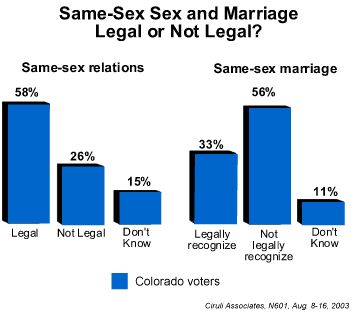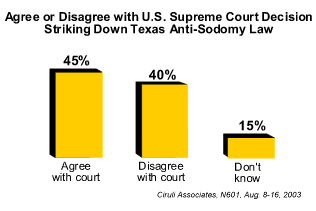Poll Analysis
December 8, 2003
Colorado Voters Support Gay Rights but Not Gay Marriage
Analysis by Floyd Ciruli
Gay rights is one of the most controversial and volatile issues in American politics. It is replacing abortion rights as the hottest issue legislators and courts are considering. The last decade produced a general increase in acceptance of gays and support for gay rights, especially related to equality of treatment in employment and housing. But a majority of people oppose gay rights related to marriage and civil unions.
Fifty-eight percent of Colorado voters support the view that sexual relations between two consenting adults of the same sex should be legal, according to a recent Ciruli Associates survey. However, a quarter of voters shift their position and a majority of voters (56%) oppose legally recognizing same sex marriage.

Question: In general, do you think sexual relations between two consenting adults of the same sex should be legal or not legal?
Question: Do you believe the state of Colorado should or should not legally recognize gay and lesbian marriage, that is marriage between adults of the same sex?
The telephone survey was conducted August 8-16, 2003, with 601 frequent Colorado voters (statistical range of accuracy ±3.8 percentage points). The survey is part of regular Ciruli Associates reports on Colorado politics and voter views on major public policy topics. To view recent Ciruli Associates public opinion reports log on to www.ciruli.com.
Polarizing Issue among Voter Groups
Gay rights is a polarizing issue. Most of the primary demographic, social and political characteristics that are analyzed for variation among voter groups show major differences regarding opinions on gay rights. A majority of Democrats and single voters support legally recognizing gay marriage. Although a majority of women, voters with a post-college education, unaffiliated voters and voters over 18 to 34 years old do not approve of gay marriage, they are more supportive of the issue than the statewide average. But for each supportive group there is an equally intense opponent such as Republicans, seniors and more religious voters.
Same-Sex Marriage
Demographic, Social and Political Differences
|
|
Percent in Sample |
Legal |
Not Legal |
Difference |
| All voters |
100% |
33% |
56% |
(23%) |
| Gender |
| Male |
48% |
28% |
61% |
(33%) |
| Female |
52% |
37% |
52% |
(15%) |
| Party |
| Republican |
42% |
15% |
74% |
(59%) |
| Unaffiliated |
24% |
38% |
54% |
(16%) |
| Democrats |
33% |
51% |
36% |
15% |
| Age |
| 18-34 |
11% |
42% |
51% |
(9%) |
| 65 plus |
23% |
17% |
75% |
(58%) |
| Education |
| High school or less |
23% |
28% |
63% |
(35%) |
| Post-college |
21% |
47% |
45% |
2% |
| Marriage status |
| Married |
66% |
28% |
63% |
(35%) |
| Single |
15% |
50% |
40% |
10% |
| Religion |
| Church weekly or more |
33% |
21% |
74% |
(53%) |
| Seldom or never |
32% |
44% |
44% |
0% |
|
Ciruli Associates, N400, Aug. 8-16, 2003
|
The most polarized voter groups are Democrats and Republicans (74% spread in the difference in views), churched and secular voters (53% difference) 18-to 34-year-old voters and seniors (49% difference), married and single (45% difference) and high school or less education and post-college voters (37% difference).
Moral and Religious Factors
In addition to partisanship, the most important factor affecting voter views on gay rights is religion and morality. Two-fifths of Colorado voters (43%) believe that sexual relations between persons of the same sex, even when consenting, is “always morally wrong.” A quarter of voters (27%) believe it is “not morally wrong at all.”
While a majority of voters support legal rights for gays, 51% have some moral qualms concerning gay sexual relations, which tend to lead them to oppose new assertions of gay rights especially related to moral and religiously associated actions such as marriage.
|
Morality of Same-Sex Sexual Relations
|
|
All
voters |
Attend
church
wkly/more |
Attend
church
seldom/
never |
| Always morally wrong |
43% |
63% |
29% |
| Almost always morally wrong |
3% |
3% |
3% |
| Morally wrong only sometimes |
5% |
3% |
7% |
| Not morally wrong at all |
27% |
15% |
39% |
| Don’t care/don’t take moral positions (vol) |
14% |
9% |
16% |
| Don’t know/refused |
7% |
8% |
6% |
Ciruli Associates, N4601, Aug. 8-16, 2003 |
Question: Do you believe sexual relations between two consenting adults of the same sex is:
Church attendance is strongly related to moral views of same-sex relations. Furthermore, religious voters are more unified in their moral views of gay sex than more secular voters. Only 15% of frequent religious attendees have a liberal view of gay rights, while 63% believe they are “always morally wrong.” Among non-church attendees, 39% believe gay sexual relations are “not morally wrong at all” and 29% believe they are “always morally wrong.”
Visibility of Issue
An overarching American sense of fairness and equality of treatment supercede views that homosexual relations are immoral. Incidents related to job and housing discrimination of gays elicit strong disapproval from a large majority of Americans (including those who believe same-sex relations are morally wrong). However, the recent focus on the right to marry has generated a hostile reaction from many voters and a notable decline in support for gay rights.
The most recent news cycle of gay rights coverage generated by the Massachusetts Supreme Court decision (Goodridge vs. Massachusetts) to recognize gay marriage was preceded last June by a Canadian court ruling that a law banning same sex marriage was discriminatory and by the U.S. Supreme Court striking down a Texas anti-sodomy law (Lawrence vs. Texas). Colorado voters were closely divided on the outcome of the Texas court case; 45% agreed with the court but 40% disagreed.

Question: In July 2003 the U.S. Supreme Court struck down a Texas law that made sodomy a crime, and ruled the law unconstitutional. Did you agree or disagree with the Supreme Court decision?
Colorado has a unique and notable history with gay rights. In 1992 voters approved Amendment 2, which was a limitation on extending gay rights by local ordinances and state statute or executive order. The U.S. Supreme Court struck down Amendment 2 in 1996 in Romer vs. Evans, a historic and often-cited decision. Further analysis of changes in Colorado and national opinion related to gay rights is in preparation and will be posted at www.ciruli.com upon completion in early 2004.
. . . . . . . . . . . . . . . . . . . . .
Ciruli Associates is a non-partisan research, communication and public policy firm providing consulting for Colorado and national organizations since 1976.
[top] [archives] [home] [send this page to a friend] |